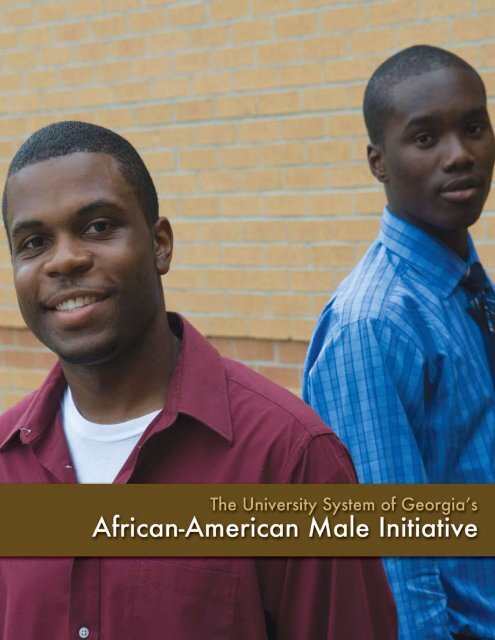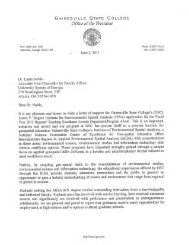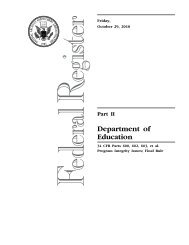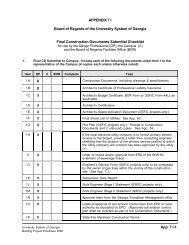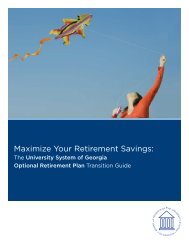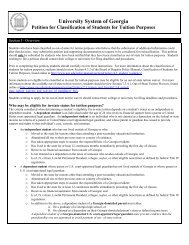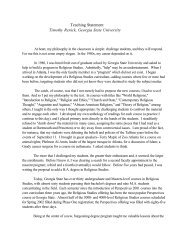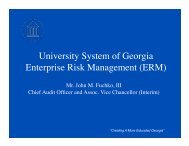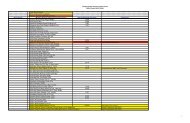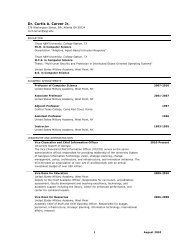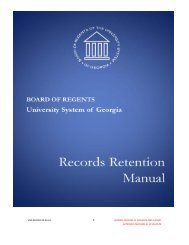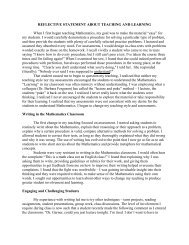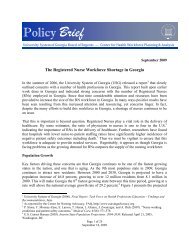University System of Georgia's African American Male Initiative
University System of Georgia's African American Male Initiative
University System of Georgia's African American Male Initiative
You also want an ePaper? Increase the reach of your titles
YUMPU automatically turns print PDFs into web optimized ePapers that Google loves.
By Jennifer Hafer<br />
Increasing<br />
education<br />
for all<br />
KSU is the new home to the <strong>University</strong> <strong>System</strong><br />
<strong>of</strong> Georgia’s efforts to improve the education<br />
<strong>of</strong> young <strong>African</strong>-<strong>American</strong> men.<br />
A <strong>University</strong> <strong>System</strong> <strong>of</strong> Georgia (USG) initiative aimed at increasing the<br />
number <strong>of</strong> <strong>African</strong>-<strong>American</strong> males enrolled in the state’s colleges and<br />
universities has a new home at Kennesaw State <strong>University</strong>.<br />
The <strong>African</strong>-<strong>American</strong> <strong>Male</strong> <strong>Initiative</strong> (AAMI), formerly based at the<br />
Atlanta <strong>of</strong>fices <strong>of</strong> the Board <strong>of</strong> Regents, has followed the project’s two top<br />
administrators to Kennesaw State.<br />
Daniel S. Papp, president <strong>of</strong> Kennesaw State, and Arlethia Perry-<br />
Johnson, KSU special assistant to the president for external affairs and<br />
AAMI’s project director, have overseen the project since its inception.<br />
“With the <strong>University</strong> <strong>System</strong> <strong>of</strong> Georgia’s <strong>African</strong>-<strong>American</strong> <strong>Male</strong><br />
<strong>Initiative</strong> now calling Kennesaw State <strong>University</strong> its home, KSU looks<br />
forward to taking a national leadership role in helping to redress the issue<br />
<strong>of</strong> too few <strong>African</strong>-<strong>American</strong> males pursuing higher education,” Papp said.<br />
Perry-Johnson said the AAMI is a good fit at KSU because it reflects one<br />
<strong>of</strong> the administration’s key goals.<br />
“Dr. Papp has articulated a strong commitment to diversity as an<br />
integral element <strong>of</strong> the university’s mission, and the goals <strong>of</strong> AAMI are<br />
symbiotic with the university’s diversity goals,” she said.<br />
Since the AAMI was launched six years ago, the enrollment <strong>of</strong> black<br />
males in the <strong>University</strong> <strong>System</strong> has increased by almost 24.5 percent, from<br />
17,068 students in fall 2002 to 21,249 in fall 2007.<br />
“The goal <strong>of</strong> the program is to increase the recruitment, retention<br />
and graduation <strong>of</strong> young black men within the USG through strategic<br />
intervention at both the K-12 and higher education levels,”<br />
Perry-Johnson said. “Many devoted persons have worked diligently<br />
under AAMI’s auspices to enhance educational outcomes for these<br />
young men. Black men are quite capable <strong>of</strong> academic achievement.<br />
But what is needed is vital direction regarding the road map to<br />
college, which many perceive as a given. For that cohort <strong>of</strong> society,<br />
the road map is not a given.”<br />
The ramifications <strong>of</strong> <strong>African</strong>-<strong>American</strong> males failing to get a<br />
college education go far beyond limiting their individual<br />
potential, according to Papp.<br />
“For many reasons, significant numbers <strong>of</strong> <strong>African</strong>-<strong>American</strong> men are not<br />
receiving the education they need to succeed and are in danger <strong>of</strong> being<br />
unable to fulfill their potential,” Papp stated. “This hurts them as individuals<br />
by limiting their options and undermines the social and economic viability <strong>of</strong><br />
Georgia and the country.”<br />
In one <strong>of</strong> its first major activities at the university, the AAMI will host a<br />
statewide “Best Practices” conference at KSU November 30 and December<br />
1, to showcase successful and effective strategies that have been used at<br />
the state and national levels to accomplish the program’s goals.<br />
The genesis <strong>of</strong> the AAMI program can be traced to a USG benchmarking<br />
initiative undertaken in 2001. The system-wide review examined<br />
every aspect <strong>of</strong> the <strong>University</strong> <strong>System</strong>’s performance, from fiscal operations<br />
to enrollment data.<br />
“When the enrollment data was scrutinized further, it became clear<br />
there were two under-represented groups in the <strong>University</strong> <strong>System</strong>:<br />
non-traditional students and black males,” Perry-Johnson said. “There was<br />
a disproportionate <strong>African</strong>-<strong>American</strong> female-to-male enrollment ratio <strong>of</strong><br />
nearly 2 to 1.”<br />
According to fall 2002 enrollment data, <strong>African</strong>-<strong>American</strong> women<br />
comprised 68 percent <strong>of</strong> the USG’s black enrollment – 35,873 black females<br />
compared to 17,068 black males. The question then became: What are the<br />
barriers to <strong>African</strong>-<strong>American</strong> male enrollment and retention in Georgia’s<br />
then 34 public colleges and universities?<br />
To answer that question, Perry-Johnson formed a 52-member task force<br />
comprised <strong>of</strong> state and national higher education and K-12 leaders. She also<br />
coordinated the collection <strong>of</strong> extensive qualitative research conducted with<br />
the target audience <strong>of</strong> black males, and quantitative telephone surveys<br />
conducted with more than 700 18-to-25-year-old black males and key<br />
influencers <strong>of</strong> their educational choices.<br />
Key recommendations resulting from the research study included the<br />
need for: tracking more <strong>African</strong>-<strong>American</strong> males into the K-12 collegepreparatory<br />
curriculum; improved cultural sensitivity training for teachers<br />
and guidance counselors; and increasing the number <strong>of</strong> high-quality<br />
teachers in hard-to-staff schools where many <strong>African</strong>-<strong>American</strong> students<br />
attend, among many other findings.<br />
“Black males cannot be competitive in today’s global society if they are<br />
educationally deficient,” Perry-Johnson said. “It is incumbent upon both the<br />
K-12 and higher education systems to leverage their resources to enhance<br />
these students’ preparedness for such competition.”<br />
KSU received a $30,000 AAMI grant in 2005 to partner with two Cobb<br />
County-area high schools and two community organizations. The KSU<br />
program, which received the Regents’ largest AAMI grant, was designed to<br />
improve the college preparedness <strong>of</strong> students from participating schools<br />
and the retention <strong>of</strong> the university’s <strong>African</strong>-<strong>American</strong> male students. The<br />
matching grant also funded a learning community for <strong>African</strong>-<strong>American</strong><br />
males and helped implement a “Summer Bridge” preparatory program.<br />
“The challenge we are addressing via AAMI is an issue <strong>of</strong> economic<br />
viability for our state and the nation,” Perry-Johnson stated.<br />
“For America to have the greatest opportunity for economic success,<br />
we need to prepare all <strong>of</strong> our students and our citizens to be competitive<br />
in the global marketplace,” she continued. “Presently, too many <strong>African</strong>-<br />
<strong>American</strong> males are falling through the cracks <strong>of</strong> our educational system,<br />
and it continues to be a serious issue with long-lasting ramifications.”<br />
A new advocate for<br />
Georgia’s <strong>African</strong>-<br />
<strong>American</strong> men<br />
Betsy Green has been<br />
named as assistant<br />
project director<br />
for the <strong>University</strong><br />
<strong>System</strong> <strong>of</strong> Georgia’s<br />
<strong>African</strong>-<strong>American</strong><br />
<strong>Male</strong> <strong>Initiative</strong>.<br />
The first full-time<br />
employee dedicated<br />
to the project since its inception in 2002,<br />
Greenwill be responsible for managing<br />
the day-to-day activities and initiatives<br />
<strong>of</strong> the AAMI. Her position is funded by<br />
the Board <strong>of</strong> Regents <strong>of</strong> the <strong>University</strong><br />
<strong>System</strong> <strong>of</strong> Georgia.<br />
After nearly a decade serving in a<br />
key advancement role at Southern<br />
Polytechnic State <strong>University</strong>, Green has<br />
spent the last seven years working as<br />
a development director at the Atlanta<br />
headquarters <strong>of</strong> Georgia Youth Science &<br />
Technology Centers – a private, nonpr<strong>of</strong>it<br />
educational organization.<br />
“We tapped Betsy for this position<br />
because <strong>of</strong> her expertise working with<br />
K-12 programs and her solid development<br />
skills,” said Special Assistant to the<br />
President for External Affairs Arlethia<br />
Perry-Johnson.<br />
Green’s first order <strong>of</strong> business is<br />
conducting a census <strong>of</strong> programs within<br />
the USG aimed at preparing more<br />
<strong>African</strong>-<strong>American</strong> males to attend and<br />
graduate from college.<br />
She also is helping to organize a<br />
best-practices conference, which is<br />
expected to draw about 250 attendees<br />
from around the state to the KSU<br />
campus.<br />
Green also will oversee a steering<br />
committee that will be responsible for<br />
establishing AAMI’s priorities and providing<br />
program oversight and feedback.<br />
In addition, AAMI will launch a new<br />
marketing initiative, “Million Dollar<br />
Player,” this fall.<br />
“So many good things already are<br />
happening with the program,” Green<br />
said. “I’m looking forward to doing<br />
my part to help reverse the trend <strong>of</strong><br />
<strong>African</strong>-<strong>American</strong> males not graduating<br />
from high school and going on to college.<br />
I want to help them succeed.”<br />
2 3<br />
Revised reprint from Kennesaw State <strong>University</strong> Magazine, Fall 2007
AAMI is Yielding<br />
Marking its six-year milestone, the <strong>University</strong> <strong>System</strong><br />
<strong>of</strong> Georgia’s <strong>African</strong>-<strong>American</strong> <strong>Male</strong> <strong>Initiative</strong> (AAMI)<br />
was launched in the summer <strong>of</strong> 2002 as a research and<br />
marketing project aimed at identifying the barriers to<br />
college attendance by <strong>African</strong>-<strong>American</strong> males within the<br />
<strong>University</strong> <strong>System</strong> <strong>of</strong> Georgia (USG). With the assistance<br />
<strong>of</strong> external researchers and a 52-member task force<br />
comprised <strong>of</strong> academics, educators, civic and business<br />
leaders from across the state and nation, extensive quantitative<br />
research and qualitative analysis was submitted to<br />
the Board <strong>of</strong> Regents <strong>of</strong> the <strong>University</strong> <strong>System</strong> <strong>of</strong> Georgia<br />
in May 2003. (See report at http://www.usg.edu/aami)<br />
As a result <strong>of</strong> this study, the Board <strong>of</strong> Regents committed<br />
to funding several pilot projects targeting the challenges<br />
and recommendations identified in the report.<br />
From 2003 through 2008, the <strong>University</strong> <strong>System</strong> <strong>of</strong><br />
Georgia has invested nearly $625,000 in AAMI pilot<br />
programs that have served black male middle-school,<br />
high-school and college students throughout Georgia.<br />
In addition, many institutions within the USG<br />
implemented self-funded efforts in<br />
support <strong>of</strong> AAMI’s goals.<br />
In July 2002, three known<br />
programs in the USG focused<br />
on improving educational<br />
outcomes for <strong>African</strong>-<strong>American</strong><br />
males.<br />
Presently, more than 19 USG<br />
institutions are operating<br />
25 different AAMI programs<br />
focusing on the K-12<br />
pipeline,college retention<br />
and student life issues.<br />
AAMI is yielding<br />
results. Between fall<br />
2002 and 2007,<br />
<strong>African</strong>-<strong>American</strong><br />
male enrollment<br />
in USG institutions<br />
has increased<br />
Results<br />
from 17,068 to 21,249 — an increase <strong>of</strong> 24.5 percent.<br />
From fall 2006 to fall 2007 alone, <strong>African</strong>-<strong>American</strong> male<br />
enrollment increased by 7.4 percent — the largest ever<br />
single-year percentage increase — resulting in 1,465 new<br />
<strong>African</strong>-<strong>American</strong> male students enrolled in USG colleges<br />
and universities.<br />
Since the program’s inception, the gap also has closed<br />
between <strong>African</strong>-<strong>American</strong> male and <strong>African</strong>-<strong>American</strong><br />
female annual enrollment growth within the USG. In fall<br />
2002, black female enrollment growth increased 9.5<br />
percent over the previous fall, compared to an enrollment<br />
growth <strong>of</strong> 7.2 percent for black males for the period.<br />
By fall 2004, the black female enrollment growth was 2.8<br />
percent, nearly on par with the black male percentage<br />
increase <strong>of</strong> 2.9 for black males. In fall 2005, black male<br />
enrollment growth <strong>of</strong> 3.1 percent nearly tripled that <strong>of</strong><br />
the black female enrollment increase <strong>of</strong> 1.4 percent.<br />
That closing <strong>of</strong> the gap continued in fall 2007, when the<br />
black female increase was 4.4 percent compared to the<br />
black male increase <strong>of</strong> 7.4 percent — significantly<br />
reversing the negative trend.<br />
The USG’s AAMI efforts also have garnered significant<br />
attention, including inquiries from other academic<br />
entities, presentations at national conferences, as well<br />
as statewide and national media coverage. This attention<br />
positions the <strong>University</strong> <strong>System</strong> <strong>of</strong> Georgia’s work<br />
in improving educational outcomes for black males as a<br />
national model.<br />
In July 2006, AAMI was awarded a two-year, $100,000<br />
grant from the Lumina Foundation for Education’s<br />
McCabe Fund. Those funds supported AAMI programs<br />
at three USG institutions and a graduate student in the<br />
<strong>University</strong> <strong>System</strong> <strong>of</strong> Georgia’s Office <strong>of</strong> Strategic<br />
Research and Policy Analysis.<br />
In August 2007, AAMI hired its first full-time employee,<br />
Ms. Betsy Green. She serves as assistant project director,<br />
supporting Arlethia Perry-Johnson, who continues<br />
to serve as project director.<br />
AAMI convened its first-ever <strong>University</strong><br />
<strong>System</strong>-wide “AAMI Best Practices<br />
Conference” in November 2007 on<br />
Kennesaw State <strong>University</strong>’s campus.<br />
Nearly 300 adult and youth<br />
participants and supporters <strong>of</strong> the<br />
USG’s various AAMI efforts convened<br />
at an invitational event to share<br />
information with their peers and to<br />
hear from nationally recognized<br />
leaders doing work in this field.<br />
In spring 2008, a Request for<br />
Proposals process was conducted<br />
within the USG to select 2008<br />
summer and 2008-2009 academic-year<br />
AAMI initiatives. As a result, $200,000<br />
was awarded to 11 USG institutions in<br />
the fourth round <strong>of</strong> AAMI pilot-grant<br />
funding.<br />
AAMI <strong>of</strong>ficials also are working<br />
collaboratively with Board <strong>of</strong><br />
Regents and GACollege411<br />
<strong>of</strong>ficials to build a collaborative<br />
website aimed at young black males,<br />
designed to provide them and<br />
their parents targeted information<br />
regarding the path to college<br />
admission, standardized test<br />
preparation and financial aid.<br />
The website will be supported by<br />
a state-wide radio and television<br />
marketing campaign called<br />
“Million Dollar Player,” designed to<br />
communicate that college graduates<br />
earn $1 million more in income over<br />
their lifetimes than high-school<br />
graduates. The website,<br />
www.aami-mdp.usg.edu, will be<br />
launched in fall 2008.<br />
4 5
The <strong>University</strong> <strong>System</strong> <strong>of</strong> Georgia’s<br />
<strong>African</strong>-<strong>American</strong> <strong>Male</strong> <strong>Initiative</strong><br />
Outcomes<br />
Enrollment<br />
The <strong>University</strong> <strong>System</strong> <strong>of</strong> Georgia<br />
has made tremendous strides with<br />
black male enrollment over the last<br />
few years. Between fall 2002 and fall<br />
2007, their enrollment increased by<br />
24.5 percent, from 17,068 in 2002<br />
to 21,249 in 2007 — an addition <strong>of</strong><br />
4,181 black male students. Among<br />
the full-time freshmen population,<br />
<strong>African</strong>-<strong>American</strong> male enrollment<br />
increased 44 percent during this<br />
same period, from 2,811 to 4,058.<br />
This outpaced both white female<br />
and white male enrollment increases.<br />
White male enrollment increased<br />
6 percent, from 10,864 in 2002 to<br />
11,569 in 2007, while white female<br />
enrollment increased 7 percent, from<br />
12,547 in 2002 to 13,444 in 2007.<br />
The <strong>University</strong> <strong>System</strong> <strong>of</strong> Georgia launched the<br />
<strong>African</strong>-<strong>American</strong> <strong>Male</strong> <strong>Initiative</strong> after USG <strong>of</strong>ficials<br />
uncovered stark data in 2001 that revealed the<br />
disproportionate number <strong>of</strong> black women versus<br />
black men enrolled in the USG – 35,000 black females<br />
compared to 17,000 black males – a more than 2:1<br />
ratio. AAMI efforts aimed at enhancing the college<br />
matriculation and graduation <strong>of</strong> black men, and <strong>of</strong><br />
helping to expand the pipeline <strong>of</strong> young black males<br />
qualified for college admission, have achieved<br />
successful performance outcomes.<br />
6 7
Retention<br />
Retention rate data in the USG<br />
is reported in two ways: “Institutionspecific”<br />
retention, which means<br />
that the student was retained at<br />
the same institution in which they<br />
initiatially enrolled; and “<strong>System</strong>wide”<br />
retention, which means that<br />
the student was enrolled at any one<br />
<strong>of</strong> the 35 institutions <strong>of</strong> the USG in<br />
their sophomore year.<br />
The system-wide retention rate for<br />
black male freshmen that entered<br />
the USG in the fall 2002 was 79<br />
percent (total number: 1,740).<br />
For the group <strong>of</strong> black men who<br />
entered the USG four years later,<br />
in the fall 2006, their retention<br />
rate improved to 80 percent. This<br />
was achieved in conjunction with a<br />
significant increase in the number <strong>of</strong><br />
black male freshmen in the fall 2006<br />
cohort (total number: 2,163).<br />
This also compares to 85 percent<br />
retention rates in fall 2002 and fall<br />
2006 for both <strong>African</strong>-<strong>American</strong><br />
females and white males, although<br />
there were four times as many white<br />
male freshmen enrolled as black<br />
males.<br />
Graduation<br />
Significant strides have been made<br />
within the USG with regard to black<br />
male graduation rates, with a 10<br />
percent increase achieved over the<br />
past four years. Citing the national<br />
benchmark <strong>of</strong> six years, the<br />
graduation rate for first-time,<br />
<strong>African</strong>-<strong>American</strong> freshmen that<br />
entered in fall 1997 was 26 percent.<br />
That rate climbed steadily for each<br />
new incoming cohort over the past<br />
several years, moving to 30 percent<br />
for the 1998 and 1999 cohorts; then<br />
to 34 percent for the 2000 cohort;<br />
and ultimately, to 36 percent for<br />
the 2001 cohort, which graduated<br />
in spring 2007. Black females also<br />
documented a 10 percent increase<br />
in their six-year graduation rates,<br />
from 37 percent for the cohort that<br />
entered in fall 1997, to 47 percent<br />
for the cohort that entered in fall<br />
2001. Again, while both groups<br />
have made very impressive gains,<br />
the challenge is to close the gap<br />
not only between black females<br />
and males, but also between black<br />
males and white males, whose<br />
six-year graduation rates improved<br />
from 49 percent to 57 percent,<br />
respectively, during this same<br />
period.<br />
Fall 1997 to Fall 2001<br />
percentange increase = 10%<br />
8 9
Degrees<br />
Conferred<br />
The <strong>University</strong> <strong>System</strong> <strong>of</strong> Georgia<br />
must increase the number <strong>of</strong> degrees<br />
conferred to <strong>African</strong>-<strong>American</strong> males.<br />
That performance indicator also is<br />
showing progress. The number <strong>of</strong><br />
degrees conferred to <strong>African</strong>-<strong>American</strong><br />
males at USG institutions increased<br />
from 1,294 in 2003 to 1,513<br />
in 2007 — an increase <strong>of</strong> 17 percent.<br />
Among <strong>African</strong>-<strong>American</strong> females,<br />
the increase was 19 percent —<br />
moving from 2,853 to 3,409.<br />
10<br />
The Challenge<br />
When the data is disaggregated — be it retention, persistence<br />
or completion — <strong>African</strong>-<strong>American</strong> males always rank at the<br />
bottom <strong>of</strong> both ethnic and gender outcomes in terms <strong>of</strong> these<br />
critical performance indicators. AAMI’s goal is to significantly<br />
increase the graduation rates <strong>of</strong> <strong>African</strong>-<strong>American</strong> males within<br />
the USG, which will contribute to both the state’s and the<br />
nation’s educational attainment levels. The good news is that<br />
the USG’s recruitment, retention and graduation rates all are<br />
showing significant improvement — but still there is more work<br />
to be done.<br />
11
UNIVERSITY SYSTEM OF GEORGIA’S AFRICAN-AMERICAN MALE INITIATIVE PROGRAMS<br />
USG Institutions Programs Academic Levels<br />
Served<br />
Albany State <strong>University</strong><br />
Augusta State <strong>University</strong><br />
Coastal Georgia<br />
Community College<br />
Center for the <strong>African</strong>-<strong>American</strong><br />
<strong>Male</strong><br />
The Center for the <strong>African</strong>-<strong>American</strong><br />
<strong>Male</strong> provides a variety <strong>of</strong> educational,<br />
enrichment and motivational activities<br />
for the development <strong>of</strong> <strong>African</strong>-<br />
<strong>American</strong> men. CAAM prepares young<br />
men for the future by providing them<br />
with mentors to help them develop<br />
useful skills in a relaxed group setting.<br />
CAAM provides programs that<br />
address the needs <strong>of</strong> students in the<br />
areas <strong>of</strong> education, mentoring and<br />
raising self-esteem, preparation for<br />
employment, conflict resolutions,<br />
tutoring and community service.<br />
The Holley Institute<br />
The Holley Institute provides precollege<br />
and freshman students<br />
needed enrichment to increase their<br />
chances <strong>of</strong> being admitted to Albany<br />
State <strong>University</strong>. The Holley Institute<br />
works to increase the SAT scores <strong>of</strong><br />
participants in order to meet minimum<br />
requirements (400 math and 430<br />
verbal) for admittance to Albany State<br />
<strong>University</strong> by providing computerbased<br />
and curriculum-based training<br />
and instruction.<br />
The Talented Tenth<br />
The Talented Tenth program was<br />
established to assist in diminishing the<br />
barriers that <strong>African</strong>-<strong>American</strong> male<br />
college students face during their<br />
years in higher education. The goal <strong>of</strong><br />
the program is to increase graduation<br />
rates. The mission is accomplished<br />
by: advancing the pr<strong>of</strong>essional and<br />
personal development <strong>of</strong> character;<br />
increasing a sense <strong>of</strong> camaraderie<br />
among its members; providing<br />
academic programming throughout<br />
grade levels K-12; and assisting<br />
students to overcome barriers by<br />
acquiring knowledge and building<br />
relationships with faculty outside <strong>of</strong><br />
the classroom.<br />
Minority Outreach Program<br />
A concentrated dropout intervention<br />
program for 7th grade <strong>African</strong>-<br />
<strong>American</strong> males, <strong>of</strong>fered over several<br />
weeks in June and July on the CGCC<br />
campus. Follow-up activities are<br />
conducted throughout the school year<br />
in a Saturday academy. Participants<br />
receive tutorial assistance, counseling<br />
and mentoring as needed.<br />
Torchbearers<br />
The mission <strong>of</strong> the Torchbearers Club<br />
is to provide <strong>African</strong>-<strong>American</strong> males<br />
the academic, social and cultural skills<br />
needed to complete college via an<br />
intense mentoring experience.<br />
Elementary School: Grade 2<br />
Middle School: Grades 6-8<br />
High School: Grades 9-12<br />
College Level: Incoming Freshmen<br />
Elementary School: Grades K-5<br />
Middle School: Grades 6-8<br />
High School: Grades 9-12<br />
College Level<br />
Middle School: Grades 6-8<br />
College Level<br />
Program<br />
Contacts<br />
Mr. Frank Wilson<br />
Director<br />
Center for the <strong>African</strong>-<strong>American</strong> <strong>Male</strong><br />
Albany State <strong>University</strong><br />
504 College Drive<br />
Albany, GA 31705-2717<br />
Frank.wilson@asurams.edu<br />
(229) 430-1911<br />
Dr. Ontario Wooden<br />
Director<br />
The Holley Institute<br />
Albany State <strong>University</strong><br />
504 College Drive<br />
Albany, GA 31705-2717<br />
Ontario.wooden@asurams.edu<br />
(229) 430-1632<br />
Ms. Karen Mobley<br />
Director <strong>of</strong> Student Development<br />
Augusta State <strong>University</strong><br />
2500 Walton Way<br />
Augusta, GA 30904-2200<br />
kmobley@aug.edu<br />
(706) 729-2351<br />
Mr. Floyd Phoenix<br />
Coordinator <strong>of</strong> Recruitment<br />
Coastal Georgia Community College<br />
3700 Altama Avenue<br />
Brunswick, GA 31520<br />
fphoenix@CGCC.edu<br />
(912) 262-3295<br />
UNIVERSITY SYSTEM OF GEORGIA’S AFRICAN-AMERICAN MALE INITIATIVE PROGRAMS<br />
USG Institutions Programs Academic Levels<br />
Program<br />
Served<br />
Contacts<br />
Columbus State <strong>University</strong><br />
Elementary School: Grades K-5<br />
Darton College<br />
Fort Valley State <strong>University</strong><br />
Gainesville State College<br />
Buddies for Success<br />
The target population for the Buddies<br />
for Success program is K-5.<br />
Boys to Men<br />
The Boys to Men program’s target<br />
population is grades six to 12. Both<br />
<strong>of</strong> these mentoring programs allow<br />
students from high-risk areas in the<br />
community to be mentored by successful<br />
<strong>African</strong>-<strong>American</strong> role models<br />
in the fields <strong>of</strong> politics, medicine and<br />
law. The students are taught life skills,<br />
leadership development, and the<br />
vices and virtues <strong>of</strong> humanity.<br />
Real Talk<br />
Real Talk is relatively new, targeting<br />
young men at the higher education<br />
level. The young men are encouraged<br />
to engage bi-weekly in real life<br />
discussions that give a true depiction<br />
<strong>of</strong> the issues facing <strong>African</strong>-<strong>American</strong><br />
males on a college campus.<br />
The goals <strong>of</strong> these programs are to<br />
provide mentoring and prepare these<br />
young men for the real world.<br />
Achieving A College Education<br />
(ACE) Fellowship Program<br />
Darton’s ACE Fellowship Program was<br />
designed and implemented<br />
to address the low number <strong>of</strong><br />
<strong>African</strong>-<strong>American</strong> males applying to,<br />
matriculating at, and graduating from<br />
Darton College. This initiative has<br />
allowed students enrolled in K-12<br />
curriculums to be introduced to higher<br />
education and supplemental instruction<br />
programs during their formative<br />
years. This effort continues to positively<br />
impact recruitment and retention.<br />
Four Pillars Learning Community<br />
A major purpose for the Four Pillars<br />
program is to improve the retention<br />
rate <strong>of</strong> first-year <strong>African</strong>-<strong>American</strong><br />
males. The program establishes a<br />
cadre <strong>of</strong> pr<strong>of</strong>essionals, referred to as<br />
the Academic Retention Consultants.<br />
These consultants provide tutorials, organize<br />
small group study sessions and<br />
conduct weekly study workshops for<br />
participants as they advance through<br />
their respective core courses.<br />
Reaching Out and Pulling Up<br />
This program works to increase the<br />
number <strong>of</strong> <strong>African</strong>-<strong>American</strong> male<br />
students who enroll in college prep<br />
classes in high school and who<br />
graduate from high school and<br />
college.<br />
Middle School: Grades 6-8<br />
High School: Grades 9-12<br />
College Level<br />
Elementary School: Grades K-5<br />
Middle School: Grades 6-8<br />
High School: Grades 9-12<br />
College Level<br />
Middle School: Grades 6-8<br />
High School: Grades 9-12<br />
College Level: Incoming Freshman<br />
Middle School: Grades 6-8<br />
High School: Grades 9-12<br />
College Level<br />
Mr. Collins B. McCrary<br />
Minority Affairs Coordinator<br />
Columbus State <strong>University</strong><br />
4225 <strong>University</strong> Avenue<br />
Columbus, GA 31907-5645<br />
Mccrary_collins@colstate.edu<br />
(706) 568-2456<br />
Ms. Wendy Wilson<br />
Director <strong>of</strong> Minority Advising<br />
Darton College<br />
2400 Gillionville Road<br />
Albany, GA 31707-3098<br />
Wendy.wilson@darton.edu<br />
(229) 317-6925<br />
Dr. Melody L. Carter<br />
VP for External Affairs<br />
Fort Valley State <strong>University</strong><br />
1005 State <strong>University</strong> Drive<br />
Fort Valley, GA 31030-4313<br />
Carterm0@fvsu.edu<br />
(478) 825-6397<br />
Dr. Dawn Herd-Clark<br />
Assistant Pr<strong>of</strong>essor <strong>of</strong> History<br />
Fort Valley State <strong>University</strong><br />
1005 State <strong>University</strong> Drive<br />
Fort Valley, GA 31030-4313<br />
Clarkd01@fvsu.edu<br />
(478) 825-6657<br />
Dr. Meigan Fields<br />
Assistant Pr<strong>of</strong>essor <strong>of</strong> Political Science<br />
Fort Valley State <strong>University</strong><br />
1005 State <strong>University</strong> Drive<br />
Fort Valley, GA 31030-4313<br />
fieldsm@fvsu.edu<br />
(478) 825-6634<br />
Ms. Andre Cheek<br />
Director <strong>of</strong> Minority Affairs<br />
Gainsville State College<br />
P.O. Box 1358<br />
Gainesville, GA 30503<br />
acheek@gsc.edu<br />
(678) 717-3749<br />
12 13
UNIVERSITY SYSTEM OF GEORGIA’S AFRICAN-AMERICAN MALE INITIATIVE PROGRAMS<br />
USG Institutions Programs Academic Levels<br />
Served<br />
Program<br />
Contacts<br />
Georgia College<br />
& State <strong>University</strong><br />
Georgia Highlands College<br />
Georgia Perimeter College<br />
Georgia Southern<br />
<strong>University</strong><br />
Georgia Southwestern<br />
<strong>University</strong><br />
Georgia State <strong>University</strong><br />
Academic <strong>Initiative</strong> for <strong>Male</strong>s<br />
Academy (AIM)<br />
AIM Academy is a week-long<br />
residential program for 20 <strong>African</strong>-<br />
<strong>American</strong> male students ages 12-16<br />
from Baldwin, Hancock, and Putnam<br />
counties. AIM Academy is based<br />
on six fundamental components: (1)<br />
residential writing program; (2) oneto-one<br />
mentoring, (3) team projects,<br />
(4) leadership development, (5) civic<br />
engagement/service learning, and (6)<br />
a completion ceremony.<br />
Georgia Highlands AAMI Program<br />
The college’s AAMI program is aimed<br />
at enhancing the recruitment, retention,<br />
and graduation <strong>of</strong> black males<br />
by <strong>of</strong>fering a first-year experience for<br />
<strong>African</strong>-<strong>American</strong> male students.<br />
Leadership Academy<br />
The Leadership Academy is a scholarship<br />
and retention program for<br />
students who are under-represented<br />
in higher education. Focusing<br />
predominately on <strong>African</strong>-<strong>American</strong><br />
males, the program <strong>of</strong>fers postsecondary<br />
educational opportunities<br />
such as financial, academic and<br />
personal support. In addition, students<br />
are well prepared to continue<br />
their education toward a bachelor’s<br />
degree.<br />
College Transition Program<br />
The College Transtion Program is a<br />
summer bridge experience designed<br />
to increase recruitment and enhance<br />
the preparation <strong>of</strong> <strong>African</strong>-<strong>American</strong><br />
males for college.<br />
On Eagles Wings – Boyz-2-Men<br />
Mentoring Academy<br />
“On Eagles Wings” is a mentoring<br />
program for <strong>African</strong>-<strong>American</strong> youths<br />
in Bulloch County, who have been<br />
identified by Educational Opportunity<br />
Programs and school personnel as<br />
being at high-risk for academic failure.<br />
This programs’s goal is to provide<br />
students with a positive and nurturing<br />
environment that will help them<br />
become confident and productive,<br />
stay in school, and set goals <strong>of</strong><br />
postsecondary education.<br />
The <strong>African</strong> <strong>American</strong> <strong>Male</strong> Institute<br />
The Institute is dedicated to developing<br />
a comprehensive mentoring and<br />
academic program. It is designed to<br />
recruit, enroll, retain and graduate<br />
<strong>African</strong>-<strong>American</strong> males at Georgia<br />
Southwestern <strong>University</strong>.<br />
Brothers Keepers<br />
Tighter Grip<br />
These two programs focus on providing<br />
<strong>African</strong>-<strong>American</strong> male undergraduates<br />
resources for their academic<br />
studies, interpersonal relationships,<br />
career focus and self-identity via<br />
group discussions, team builders and<br />
lectures. The males also are encouraged<br />
to enhance their leadership<br />
abilities by actively participating on<br />
executive boards for the many student<br />
organizations at the university. The<br />
program’s goals are to increase the<br />
retention, progression and graduation<br />
percentages <strong>of</strong> <strong>African</strong>-<strong>American</strong><br />
males at Georgia State <strong>University</strong>.<br />
High School: Grades 9-12<br />
Middle School: Grades 6-8<br />
High School: Grades 9-12<br />
College Level: Incoming Freshman<br />
High School: Grades 9-12<br />
College Level: Incoming Freshman<br />
Middle School: Grades 6-8<br />
High School: Grades 9-12<br />
High School: Grades 9-12<br />
College Level: Incoming Freshman<br />
College Level<br />
Ms. Allia L. Carter<br />
Director <strong>of</strong> Diversity & Multicultural Affairs<br />
Georgia College & State <strong>University</strong><br />
P.O. Box 23<br />
Milledgeville, GA 31061<br />
Allia.carter@gcsu.edu<br />
(478) 445-6293<br />
Dr. Jon Hershey<br />
Pr<strong>of</strong>essor <strong>of</strong> English<br />
Georgia Highlands College<br />
3175 Cedartown Highway, SE<br />
Rome, GA 30161<br />
jhershey@highlands.edu<br />
(706) 368-7629<br />
Ms. Colletta Hassell<br />
Project Director<br />
Georgia Perimeter College Leadership<br />
Academy<br />
Georgia Perimeter College<br />
3251 Panthersville Road<br />
Decatur, GA 30034-3897<br />
Chassell@gpc.edu<br />
(678) 891-2455<br />
Ms. Sue Hawks-Foster<br />
Director, TRIO<br />
Georgia Southern <strong>University</strong><br />
PO Box 8055<br />
Statesboro, GA 30460<br />
sfoster@georgiasouthern.edu<br />
(912) 681-5458<br />
Mr. Ervin D. Anderson<br />
Assistant Pr<strong>of</strong>essor <strong>of</strong> Mathematics<br />
Georgia Southwestern <strong>University</strong><br />
800 Georgia Southwestern State Univ. Drive<br />
Americus, GA 31709-4693<br />
eda@canes.gsw.edu<br />
(229) 931-2200<br />
Dr. Doris A. Derby<br />
Director, <strong>African</strong>-<strong>American</strong> Student Services<br />
and Programs<br />
Georgia State <strong>University</strong><br />
P.O. Box 3965<br />
Atlanta, GA 30303-3083<br />
STDDAD@langate.gsu.edu<br />
(404) 413-1530<br />
UNIVERSITY SYSTEM OF GEORGIA’S AFRICAN-AMERICAN MALE INITIATIVE PROGRAMS<br />
USG Institutions Programs Academic Levels<br />
Served<br />
Kennesaw State <strong>University</strong><br />
College Level<br />
Medical College<br />
<strong>of</strong> Georgia<br />
Southern Polytechnic<br />
State <strong>University</strong><br />
The <strong>University</strong> <strong>of</strong> Georgia<br />
<strong>University</strong> <strong>of</strong> West<br />
Georgia<br />
Valdosta State <strong>University</strong><br />
KSU <strong>African</strong> <strong>American</strong> <strong>Male</strong><br />
<strong>Initiative</strong><br />
The KSU AAMI’s goal is to enhance<br />
the recruitment, retention and<br />
graduation <strong>of</strong> <strong>African</strong>-<strong>American</strong> males<br />
entering as first-time, full-time<br />
students at KSU. Participants include<br />
<strong>African</strong>-<strong>American</strong> males in the KSU<br />
AAMI Learning Community, as well<br />
as members <strong>of</strong> the KSU Distinguished<br />
Black Gentlemen student organization.<br />
Call Me Doctor<br />
The purpose <strong>of</strong> this project is to<br />
provide health-career enrichment<br />
activities to selected 11th and 12th<br />
grade males attending high school in<br />
Richmond County, who have an<br />
interest in a career in medicine, and<br />
who have at least a 3.0 grade point<br />
average. This program includes an<br />
introduction to medicine and the<br />
academic preparation required,<br />
exposure to the anatomy lab,<br />
mentoring by MCG medical students,<br />
physician speakers, college field<br />
trips and presentations on personal<br />
development.<br />
Success Through Advanced and<br />
Resourceful Students (STARS)<br />
This program is designed to widen<br />
the pipeline <strong>of</strong> <strong>African</strong>-<strong>American</strong><br />
males entering science, technology,<br />
engineering and math disciplines,<br />
ultimately increasing the number <strong>of</strong><br />
students enrolling at SPSU.<br />
Gentlemen on the Move<br />
GOTM is a developmental and<br />
comprehensive initiative that aims<br />
to transform adolescent <strong>African</strong>-<br />
<strong>American</strong> males, by assessing where<br />
they are, where they should be<br />
(academically and socially), and by<br />
providing them with the necessary<br />
tools to complete the transformation.<br />
Black Men With <strong>Initiative</strong> (BMWI)<br />
This initiative was instituted in 2002 to<br />
develop culturally aware, academically<br />
strong, community-minded, and<br />
spiritually grounded <strong>African</strong>-<strong>American</strong><br />
male leaders.<br />
HEROES Institute<br />
(Helping Everyone Receive<br />
Optimum Educational Success)<br />
HEROES encourages black males to<br />
graduate from high school and, to<br />
broaden their career alternatives and<br />
graduating with a degree, preferably<br />
from a <strong>University</strong> <strong>System</strong> <strong>of</strong> Georgia<br />
school. The VSU AAMI Team <strong>of</strong>fers<br />
Saturday academic classes in English,<br />
Algebra I, Social Studies and French<br />
to 25 ninth grade <strong>African</strong> <strong>American</strong><br />
males.<br />
High School: Grades 11-12<br />
Middle School: Grades 6-8<br />
College Level<br />
Middle School: Grades 6-8<br />
High School: Grades 9-12<br />
College Level<br />
High School: Grade 9<br />
College Level<br />
Program<br />
Contacts<br />
Ms. Nicole Phillips<br />
Assistant Director <strong>of</strong> Minority Student<br />
Retention Services<br />
Kennesaw State <strong>University</strong><br />
1000 Chastain Road<br />
Kennesaw, GA 30144-5591<br />
nphill10@kennesaw.edu<br />
(770) 499-3546<br />
Dr. Wilma Sykes Brown<br />
Assistant Dean<br />
Educational Outreach & Partnerships<br />
Medical College <strong>of</strong> Georgia<br />
1120 Fifteenth Street<br />
Augusta, GA 30912<br />
wsykes@mail.mcg.edu<br />
(706) 721-2522<br />
Dr. Jeff Orr<br />
Director<br />
Advising, Testing, Tutoring, and<br />
International Student Center<br />
Southern Polytechnic State <strong>University</strong><br />
1100 South Marietta Parkway<br />
Marietta, GA 30060-2896<br />
jorr@spsu.edu<br />
(678) 915-7489<br />
Dr. Deryl Bailey<br />
Associate Pr<strong>of</strong>essor<br />
Counseling & Human Development Services<br />
The <strong>University</strong> <strong>of</strong> Georgia<br />
Athens, GA 30602<br />
dfbailey@uga.edu<br />
(706) 583-0126<br />
Dr. Said Sewell<br />
Associate Pr<strong>of</strong>essor<br />
Department <strong>of</strong> Politcal Science<br />
<strong>University</strong> <strong>of</strong> West Georgia<br />
1601 Maple Street<br />
Carrollton, GA 30118<br />
ssewell@westga.edu<br />
(678) 839-4997<br />
Dr. Shirley H. Hardin<br />
Project Director<br />
HEROES Institute<br />
Valdosta State <strong>University</strong><br />
1500 North Patterson Street<br />
Valdosta, GA 31698<br />
shardin@valdosta.edu<br />
(229) 249-4843<br />
14 15
“Creating a More Educated Georgia”<br />
www.usg.edu/aami<br />
For more information, please contact:<br />
Arlethia Perry-Johnson, Director,<br />
<strong>University</strong> <strong>System</strong> <strong>of</strong> Georgia’s<br />
<strong>African</strong>-<strong>American</strong> <strong>Male</strong> <strong>Initiative</strong><br />
aperryjo@kennesaw.edu<br />
770-423-6350<br />
Betsy Green, Assistant Director,<br />
<strong>University</strong> <strong>System</strong> <strong>of</strong> Georgia’s<br />
<strong>African</strong>-<strong>American</strong> <strong>Male</strong> <strong>Initiative</strong><br />
betsy_green@kennesaw.edu<br />
770-499-3694<br />
1


